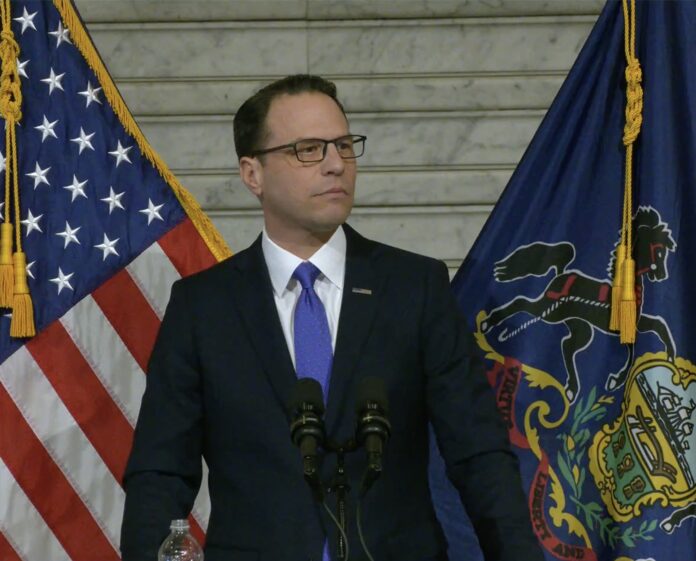
Gov. Josh Shapiro announced his priorities for this upcoming year’s budget in a speech he delivered in Harrisburg Feb 6. Among other goals, he emphasized his vision for continued investments in Pennsylvania’s infrastructure, education and healthcare — areas of focus that deeply impact LGBTQ+ people across the commonwealth.
In his speech, he also acknowledged the Fairness Act, first introduced in the 1970s, which finally passed the State House of Representatives in April 2023. He urged the State Senate to follow suit now that the bill awaits confirmation in their chamber.
The bill is a proposed amendment to the Pennsylvania Human Relations Act of 1955, which safeguards some groups of marginalized people from discrimination in employment, housing, commercial property, education and public accommodations. The amendment would solidify protections for LGBTQ+ people by adding sexual orientation as well as gender identity and expression to the state’s list of protected classes.
“Back in 1974, right here in Harrisburg, Gov. Milton Shapp — working alongside my friend [PGN Publisher] Mark Segal who joins us today — became the first governor in the nation to meet with the LGBTQ community,” Shapiro said. “And one year later, he became the first to ban discrimination against LGBTQ state employees.”
“That’s a history we should be proud of. We were leading the nation when it came to LGBTQ rights — and now we are falling behind,” he underlined.
An annual report released by the Human Rights Campaign recently named Pennsylvania 25th out of 50 states regarding anti-discrimination protections for LGBTQ+ people. Shapiro highlighted those lack of protections:
“It’s ridiculous that here in Pennsylvania, two women can get married on a Sunday and then fired from their job on a Monday just because they’re in love, that their landlord can legally throw them out of their apartment just because he’s bigoted,” he said.
“The House passed the Fairness Act to fix this,” Shapiro underlined. “The Senate should honor our legacy of tolerance and pass that bill and put it on my desk.”
The floor erupted in applause, to which he commented, “Got a lot of bipartisan claps for that.”
It will take a bipartisan effort to pass the Fairness Act, which already required two Republican votes to clear the House. Republicans currently outnumber Democrats in the Senate, 28 – 22 — but this year’s elections could close that gap
Shapiro declared the need to “recognize the dignity of every Pennsylvanian,” noting his sense of pride in William Penn’s intentions as the founder of the commonwealth — that the state would be “a place where there are no second class citizens.”
To ensure that Pennsylvania’s most marginalized people have the resources they need to succeed, he also wants to raise the minimum wage — which has been stuck at $7.15 per hour for 15 years. The House passed a bill that would raise the state’s minimum wage to $15 per hour — another piece of legislation that required two Republican votes to secure its success. He urged the Senate to confirm it.
“I’m not looking to give a hand out. I want to give a hand up and create opportunity here in our economy that gives everyone a shot,” he said. “In order to create that kind of opportunity, Pennsylvanians need to earn a decent wage.”
Shapiro is concerned about medical debt and healthcare issues, including the cost of care and prescriptions as well as access to mental health services. He discussed the need to support formerly incarcerated Pennsylvanians, those facing potential evictions, and people impacted by gun violence. He’s bolstering financial support to address these and other issues.
He’s also concerned about aging populations and is establishing more programs — such as the Alzheimer’s Disease Division at the Department of Aging — to support the needs of this demographic. Shapiro is investing an additional $50 million into the Whole Homes Repair Program, which has benefitted those who struggle to afford the upkeep of their homes — a significant problem for seniors, including LGBTQ+ elders who are at greater risk for homelessness.
“All these investments are being made as we get ready to implement the first ever master plan on aging,” he said. “Because our seniors deserve support so they can live out their golden years with dignity.”
“Penn had a vision of a place that would be an example to the nations, a place of tolerance and peace and prosperity, where leaders would make wise and just decisions in service to all people,” Shapiro noted at the start of his speech.
“Penn’s vision was a commonwealth that would welcome people from all backgrounds, a commonwealth where everyone would have the freedom to chart their own course and the opportunity to succeed, a commonwealth where the government is responsive to the needs of the people and works together to get stuff done,” he said. “I’m mindful that we’re all part of that lineage.”
“So when I walk these halls and I see these depictions of our past, I can’t help but feel optimistic about our future — a future we will build together, staying true to the words and the creed of Penn as we work to do what is truly wise and just,” he said as he closed his speech. “Thank you all. Now let us get to work together.”